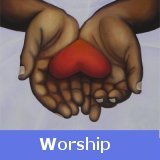
|
 |

|

KIM SMITHART GALLERY
LETTERS
JOURNALSUnderwear Gift PackUnited Caribbean |
home >>letters
of encouragement>>unholy alliances JEHOSHAPHAT – Unholy Alliances Dear Friends, We can learn a lot from different people in the Bible. Each of them had a unique experience with God. Jehoshaphat means “God has judged”. Jehoshaphat became King of Judah at age 35. He reigned for 25 years, and passed away at age 60. Jehosphaphat had a very good start in his reign as King. “The Lord was with Jehoshaphat because in his early years he walked in the ways his father David had followed.” (2 Chron. 17:3a NIV) He was not involved in false worship, such as Baal worship, but followed God. “His heart was devoted to the ways of the Lord.” (2 Chron. 2a NIV) He removed the high places and Asherah poles from Judah. These were places of false worship. All Judah brought gifts to Jehoshaphat, and he had great wealth and honour. Jehoshaphat also sent his officials, along with the Levites – the Holy Priests, throughout Judah to teach from the Book of the Law! Here, Jehoshaphat displays an interest in the spiritual condition of the people. Because of his love and obedience to God, the tribes around Judah did not make war with them, but instead, his enemies brought him gifts of wealth. Jehoshaphat became more and more powerful, and he built up his military strength. Jehoshaphat’s mistake came when he made an unholy alliance with King Ahab, King of Israel, through marriage. They became family. King Ahab had married Jezebel, a High Priestess, involved in Baal worship. Jehoshaphat had compromised himself. King Ahab wanted Jehoshaphat to go into battle with
him against Ramoth Gilead. Jehoshaphat suggested that they “first
seek the counsel of the Lord”. So King Ahab brought in 400 prophets, and they prophesied military victory against Ramoth Gilead. Strangely enough, Jehoshaphat asked, “Is there not a prophet of the Lord here whom we can inquire of?” (2 Chron. 18:6b NIV) The prophet Micaiah was summoned. He had been told by the messenger to agree with what the other prophets were prophesying. Micaiah declared that he would only utter God’s Word. King Ahab did not like Micaiah as he never prophesied in his favour. Micaiah agreed with the prophesy that the other prophets gave. King Ahab did not believe Micaiah, and demanded to hear God’s Word. Micaiah had a revelation of what transpired in the spiritual realm. God, Himself, allowed a lying spirit to go on to the 400 prophets. It was the Lord who wanted King Ahab to go into battle against Ramoth Gilead. The false prophet, Zedekiah, challenged the word Micaiah gave, and slapped him in the face! Zedekiah really slapped God in His Face! This was open defiance against God! And he was ultimately judged for this. Zedekiah declared that Micaiah was lying. This was an open confrontation between a true prophet vs. a false prophet. Micaiah was thrown into prison until King Ahab returned safely. Only King Ahab’s safe return would determine which prophet was telling the Truth. It seemed that Jehoshaphat lacked discernment, for even after hearing the Word of the Lord, he went along into battle as an ally of King Ahab. King Ahab went into battle in disguise. I guess he thought he could fool the enemy, and fool God. The enemy then thought that Jehoshaphat was King Ahab, and set out to kill him, but Jehoshaphat cried out to God, and God saved him! God was still faithful to Jehoshaphat despite his disobedience. However, King Ahab was hit by a “random” shot, in between a section of his armour where he would have been vulnerable. Ahab was fatally wounded, and died. This was God’s Judgement against Ahab. Jehoshaphat returned to Jerusalem safely. Another prophet, named Jehu, confronted Jehoshaphat about his unholy alliance with King Ahab. “Should you help the wicked and love those
who hate the Lord? Because of this, the wrath of the Lord is upon
you. There is, however, some good in you, for you have rid the land
of the Asherah poles and have set your heart on seeking God.” It was only because Jehoshaphat had done good in the past, that God was merciful to him. In direct contrast with this battle, was another
battle that Jehoshaphat encountered. The Moabites, Ammonites and
some Meunites decided to make war against Jehoshaphat, and Jehoshaphat
heard about it. They were completely putting their trust in God. They were not using their own strength, or working the situation out in their minds. They had just put it before God, and waited for His Divine Intervention! This seems to be an excellent strategy to use in our own lives! We must bring our situations, big or small, before God. We must pray, wait, and listen for His Direction. We must trust God more to work on our behalf. The Spirit of the Lord came upon Jahaziel, a Levite. The answer to prayer came! It was a Word of Knowledge. God told them exactly where to encounter the army the following day. He said that they should stand firm, and take up their positions, as they would not have to fight this battle! Jehoshaphat responded by bowing with his face to the ground. This was a demonstration of humility – an earthly king bowing before the King of Kings! He acknowledged God’s Prophetic Word. All the people fell down in worship before God as well. This was a public demonstration of God’s Lordship in their lives. Then the Levites (or priests) stood up, and praised God loudly! The following day, Jehoshaphat set out as God had instructed. Jehoshaphat encouraged the people to have faith in God, and His Prophetic Word. And as they went out to battle, the worshippers went first. As they praised God; God set up ambushes in the enemy camp. The enemy ended up destroying each other. When the men of Judah arrived at the place where God told them to go, overlooking the desert, they only saw dead bodies. All were killed! The “vast” army was defeated! Praise is such a powerful weapon in the Hands of the Lord! We must never underestimate the POWER of Praise! It took three days for Jehoshaphat and his men to collect the plunder and take it away! These are the Blessings and Favour of God that we do not have to work for! We just go out and collect them! On the fourth day, they gathered together and praised God in corporate worship in the valley of Beracah, which means “the valley of praise”. Jehoshaphat and the men rejoiced that God had given them the victory! When they arrived in Jerusalem, they went immediately to the Temple to worship again. And the Fear of the Lord came on the various kingdoms surrounding Jehoshaphat, and there was peace on every side of the Israelites. Peace is a Blessing from God. The two battles show a very interesting contrast. In the first battle, Jehoshaphat inquires of God, and still disobeys, which leads to defeat! He is saved by the Mercy of God. In the second battle, Jehoshaphat inquires of God, and follows God’s instructions completely. He wins the battle without even fighting it, and receives a financial blessing, and peace for all the Israelites. We no longer have to fight our own battles anymore! We can believe God to work them out for our best interest! Later on, Jehoshaphat made another unholy alliance
with King Ahaziah of Israel, who was the son of King Ahab. King
Ahaziah was wicked, just like his father, King Ahab. It was a business
deal. They built a fleet of trading ships together. However, the
fleet was destroyed before they could even begin to trade. This
was prophesied by Eliezer against Jehoshaphat, saying, “Because
you have made an alliance with Ahaziah, the Lord will destroy what
you have made.” Jehoshaphat sought to serve God, and he did some commendable things in his life. However, he also made serious mistakes. He formed unholy alliances with wicked people through marriage, and a business venture. This serves to show us how important are the people we come into covenant relationships with. We should choose a marriage partner who is a Christian, and at a similar spiritual level as ourselves. And we need to watch that we also go into business partnerships with Christians who are sincerely following God. When we please God, He is pleased with us, and pleased to bless us! All our major decisions we must put before God and seek His Counsel. Our obedience will spare us heartbreak and suffering. Living God’s Way will bring us into God’s very best for our lives! Hallelujah! |
| Copyright © 2022 www.UnitedCaribbean.com. All rights reserved. Disclaimer Click to Contact us |





